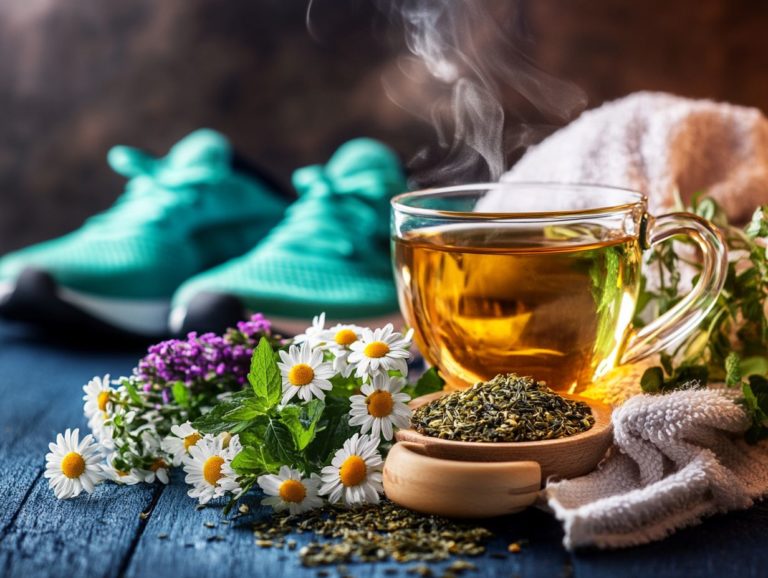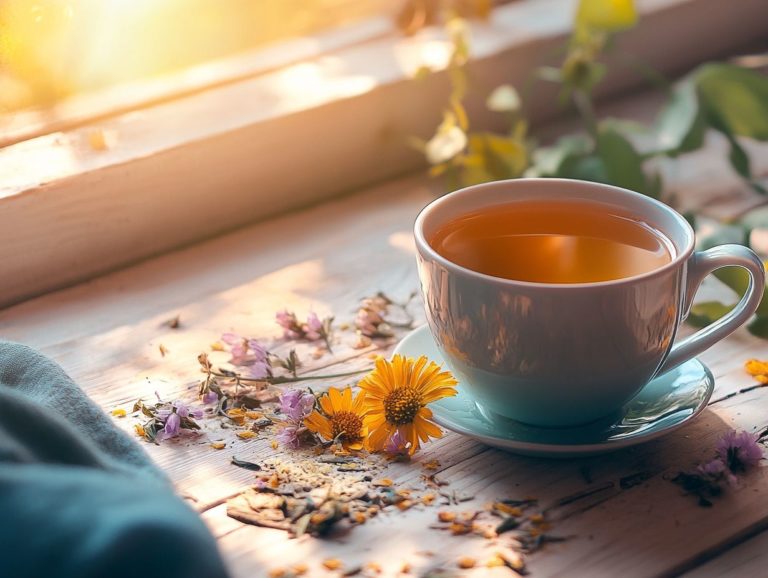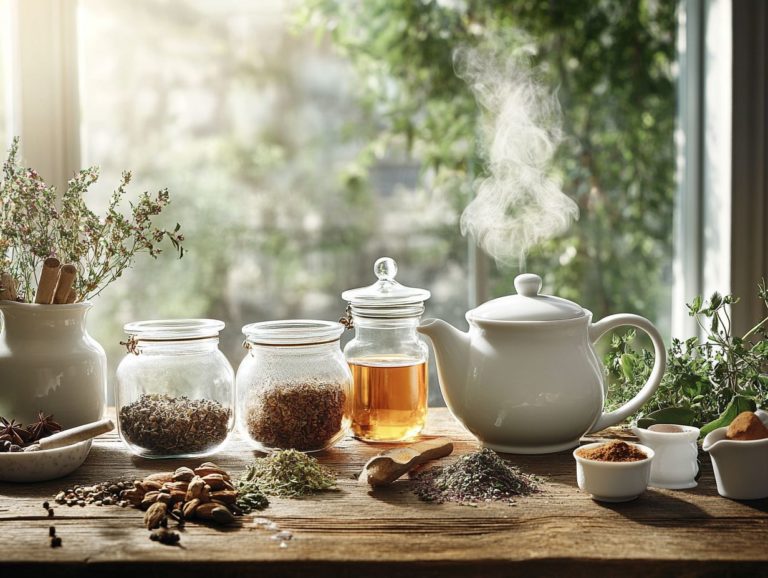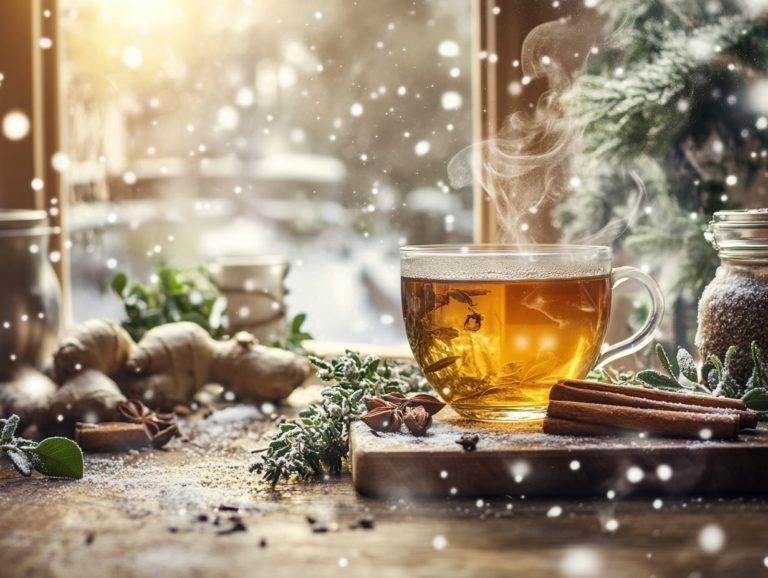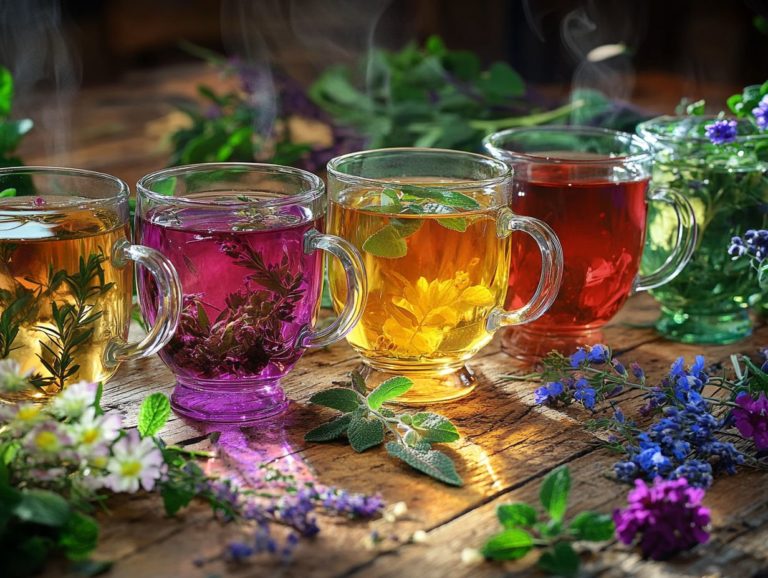5 Comforting Herbal Tea Recipes for Cold Days
As the chill of cold days envelops you, few things can compare to the comforting embrace of a warm cup of herbal tea, especially during the cozy season of winter teas.
This article invites you to explore five delightful herbal tea recipes, each offering its own unique blend of flavors and health benefits. From the calming notes of chamomile and lavender to the invigorating zing of ginger and turmeric, you ll uncover how these teas can help alleviate cold and flu symptoms and elevate your well-being.
You ll also dive into the various types of herbal tea and their therapeutic properties. Plus, you’ll gain valuable tips on seamlessly incorporating these soothing brews into your daily routine, including fresh herbs and spices.
Grab your favorite mug and get ready for a cozy treat with these tea recipes, akin to comfort food for the soul!
Contents
- Key Takeaways:
- 1. Chamomile and Lavender Tea
- 2. Ginger and Turmeric Tea
- 3. Peppermint and Lemon Tea
- 4. Cinnamon and Honey Tea
- 5. Echinacea and Elderberry Tea
- Discover the Amazing Health Benefits of Herbal Tea and Its Healing Powers!
- What Are the Different Types of Herbal Tea and Their Unique Health Benefits?
- How Can Herbal Tea Help with Common Cold Symptoms and Boost Your Immune System?
- Are There Any Precautions to Take When Drinking Herbal Tea?
- Can Herbal Tea Be Used as a Natural Remedy for Other Health Conditions?
- How Can One Incorporate Herbal Tea into Their Daily Routine?
- Frequently Asked Questions
Key Takeaways:
- Unwind with a cup of Chamomile and Lavender Tea for a soothing and relaxing experience on cold days, perfect for winter.
- Boost your immune system with the anti-inflammatory qualities of Ginger and Turmeric Tea to fight off common cold symptoms and enhance your health.
- Relieve congestion and soothe a sore throat with the refreshing blend of Peppermint and Lemon Tea, known for its healing powers.
1. Chamomile and Lavender Tea
Chamomile and Lavender Tea is a soothing blend that truly embodies winter teas, offering a perfect balance of flavors. Combining the relaxing qualities of chamomile with the aromatic richness of lavender creates the ultimate comfort drink for those chilly evenings when you long to relax.
The unique qualities of chamomile promote restful sleep and ease digestive discomfort. Lavender brings not only an enchanting scent but also acts as a natural stress reliever. Together, they create a harmonious synergy meaning how well they work together that alleviates anxiety and enhances overall well-being.
For a simple yet delightful tea experience, steep one chamomile tea bag along with a teaspoon of dried lavender blossoms in hot water for about five minutes. If you’d like, add a touch of honey, a wonderful complement to the flavors of chamomile and lavender. Savoring this tea regularly can significantly enhance your relaxation and fortify your body’s defenses, making it an essential staple for those colder months when self-care is crucial. Additionally, exploring healing teas for seasonal allergies can provide extra support during allergy season.
2. Ginger and Turmeric Tea
Ginger and Turmeric Tea showcases the remarkable combination of ginger root and turmeric, both celebrated for their exceptional health benefits especially in supporting your immune system during winter.
These two powerful ingredients are known for their ability to combat inflammation and their abundant antioxidant properties. When brewed into a calming tea, ginger and turmeric release their natural compounds, promoting better digestion and enhancing your vitality.
Creating this tea is simple. Start with the following ingredients:
- A few slices of fresh ginger for a zesty kick,
- A teaspoon of turmeric powder known for its healing powers,
- A dash of black peppercorns to boost absorption.
Feel free to experiment with variations, like adding honey or lemon to elevate the flavor while amplifying its soothing effects. Consider adding orange peel for a citrus twist. This tea is a staple in many herbal remedies, making it an invaluable addition to your wellness routine.
3. Peppermint and Lemon Tea
Peppermint and Lemon Tea is a refreshing herbal blend that delights your taste and helps fight cold and flu symptoms while supporting your immune system during the chilly season.
This invigorating combination taps into the soothing qualities of peppermint, easing sore throats and congestion. At the same time, vitamin C-rich lemon effectively boosts your immune system and keeps your body hydrated, making it an essential part of any tea recipe.
Making this infusion is easy! Simply steep a few fresh peppermint leaves and slices of lemon in hot water for about five to ten minutes. You can also add orange for an extra kick. For additional flavor and health benefits, consider adding a spoonful of honey or ginger to transform this tea into your comforting go-to drink, packed with healing powers.
4. Cinnamon and Honey Tea
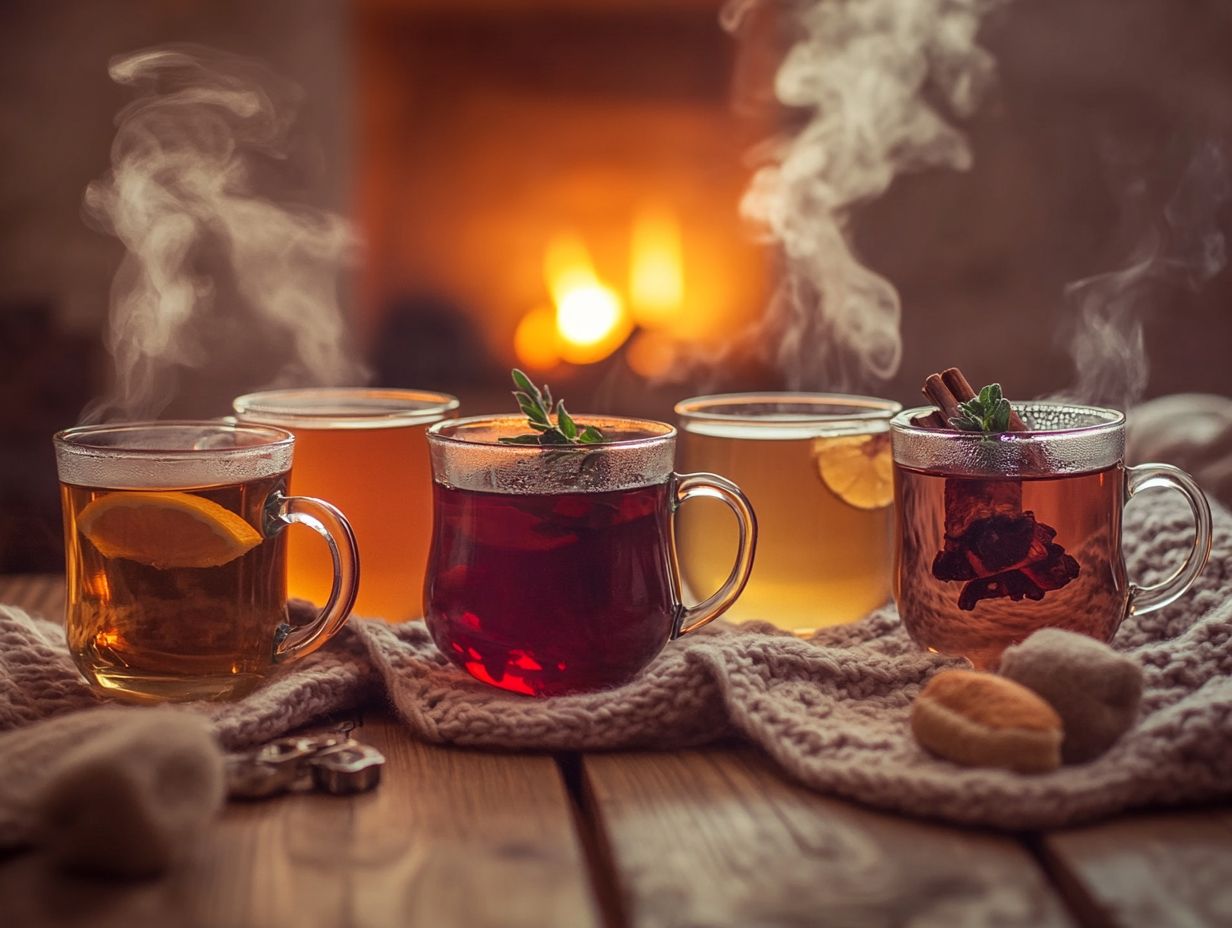
Cinnamon and Honey Tea is your go-to blend, marrying the warm, inviting essence of cinnamon sticks with the natural sweetness of honey. This herbal tea offers great health benefits during winter, especially when you’re seeking warmth and comfort.
This combination is renowned for its extensive health benefits, particularly for enhancing your immune system. The soothing properties of honey work wonders for a sore throat, while cinnamon helps reduce swelling and fights off damage from free radicals, making this tea a holistic remedy.
Feeling adventurous in the kitchen? You can craft variations like a spiced honey lemon tea with a splash of fresh lemon juice or a creamy cinnamon-honey chai by incorporating warm milk and spices. For those looking for more options, consider exploring DIY herbal remedies for common cold relief. Each recipe offers nourishment, transforming a simple drink into a revitalizing health elixir that warms both body and soul.
5. Echinacea and Elderberry Tea
Echinacea and Elderberry Tea is your herbal remedy renowned for its exceptional immune-boosting properties, making it a top choice during winter. This tea is perfect for fending off pesky colds and flu while reaping the medicinal benefits of elderberry.
Both echinacea and elderberry have a rich legacy in traditional medicine, celebrated for their ability to bolster your body’s defenses. Echinacea has long been a trusted ally for Native American tribes in treating infections, while elderberry has been favored in ancient Europe for its antiviral prowess. Brewing these botanical treasures into a tea not only offers comfort but also enhances your overall wellness.
To prepare, combine the following ingredients:
- One teaspoon of dried echinacea,
- One tablespoon of elderberries, known for their rich antioxidants.
Place them in a teapot filled with boiling water. Let it steep for at least 10 minutes, and consider adding a splash of honey or lemon to elevate the naturally rich flavors and enhance the tea’s therapeutic value.
Discover the Amazing Health Benefits of Herbal Tea and Its Healing Powers!
Herbal tea offers an amazing range of blends that can transform your health, especially during the winter months. These delightful brews are beneficial for strengthening your immune system and providing therapeutic relief during the colder season.
Aromatic options like chamomile and peppermint not only soothe your senses but also improve digestion. They serve as natural remedies for inflammation, making them essential during the cold season. For those looking to explore more, crafting herbal tea blends for every mood can be beneficial. Chamomile, with its calming qualities, helps alleviate anxiety and promotes restful sleep, which is crucial in winter when stress levels can rise.
Peppermint tea eases digestive discomfort and reduces bloating, particularly after holiday feasts. If you’re seeking relief from soreness or tension, ginger tea’s anti-inflammatory effects make it an excellent choice during winter when many suffer from colds.
By incorporating these herbal varieties into your daily routine, you can embrace their therapeutic benefits, fostering a balanced and vibrant lifestyle.
What Are the Different Types of Herbal Tea and Their Unique Health Benefits?
There s a vast array of herbal teas, each boasting its own unique flavors and health benefits. From the invigorating notes of peppermint to the calming essence of chamomile, there truly is something for every palate and purpose, including warming winter tea blends.
Take rooibos, for instance. This caffeine-free gem is rich in antioxidants, which are substances that help protect your cells from damage. Rooibos is often enjoyed for its sweet flavor and potential to support heart health, making it a great addition to your herbal tea collection.
Then there s hibiscus tea, known for its delightful tartness. It can help regulate blood pressure, making it a refreshing choice for those on a wellness journey. If you re in the mood for a bit of spice, reach for ginger tea, which offers a zesty kick that aids digestion, especially with the addition of black pepper.
On the other hand, lemon balm is revered for its soothing qualities, making it ideal for stress relief during the busy winter season. Don t forget about popular blends like chai, which harmoniously combine multiple spices and herbs for a holistic flavor and health experience.
Whether you’re seeking a calming ritual to unwind or a refreshing boost to start your day, herbal teas open up a diverse world of flavors and benefits just waiting to be explored. Check out these 5 delightful DIY herbal teas for wellness—there are endless tea recipes to discover!
How Can Herbal Tea Help with Common Cold Symptoms and Boost Your Immune System?
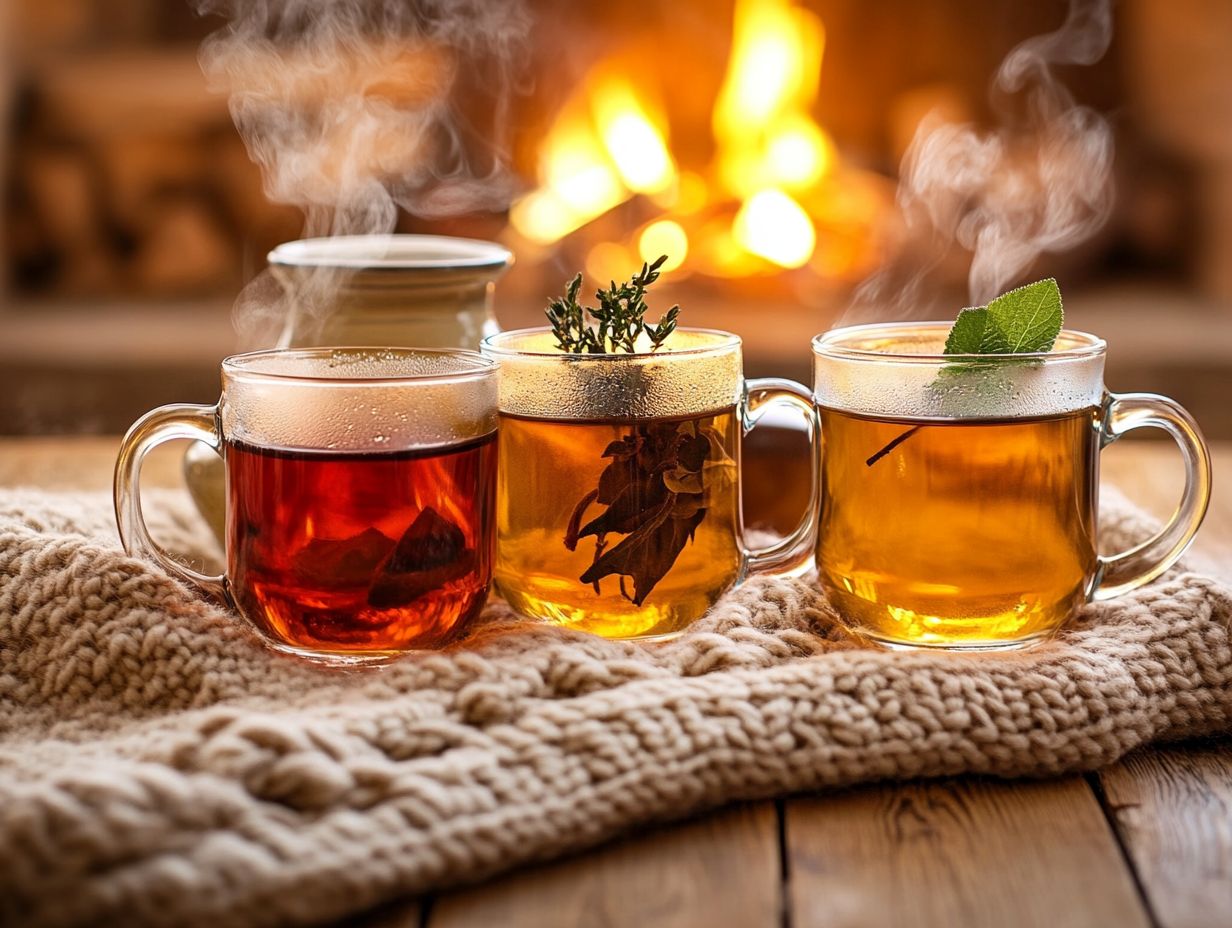
Herbal tea can be your natural ally against the pesky symptoms of the common cold. Its unique blend of ingredients works to soothe sore throats, relieve congestion, and enhance your immune system s ability to combat illness.
For example, ginger tea offers immediate relief for annoying sore throats, thanks to its remarkable anti-inflammatory properties. Combining it with honey or lemon adds flavor and health benefits. When it comes to kids, trying out 5 herbal tea recipes for kids can be a fun way to incorporate beneficial herbs. Echinacea is renowned for its immune-boosting prowess, making it especially advantageous during cold season, particularly when brewed with elderberry.
Adding a drizzle of honey enhances flavor and taps into its natural antibacterial qualities, which can assist in alleviating coughing.
To seamlessly incorporate these herbal teas into your cold care routine, brew a fresh cup every few hours. This practice keeps your hydration levels in check while delivering soothing benefits. Preparing a thermos of ginger and honey tea for sipping throughout the day can provide consistent relief and comfort.
Are There Any Precautions to Take When Drinking Herbal Tea?
While herbal tea offers numerous health benefits, it s essential to consider certain precautions to ensure safe consumption. This is particularly important if you have specific health conditions or sensitivities.
Certain herbal ingredients, like ginseng or St. John’s Wort, can interact with medications or worsen existing conditions. Consult your healthcare provider before adding these teas to your routine. Be mindful of dosages, too; excessive consumption may lead to side effects like digestive issues or allergic reactions.
If you re new to herbal teas, start with small amounts and monitor for any adverse reactions. Choosing high-quality products from reputable sources ensures that you can enjoy the benefits without unnecessary risks.
Can Herbal Tea Be Used as a Natural Remedy for Other Health Conditions?
Herbal tea is a fantastic natural remedy for various health conditions, offering health benefits that extend beyond merely soothing winter ailments. It can help with important issues like digestion, inflammation, and stress.
Take chamomile tea, for example; it’s well-known for its calming effects and is especially beneficial for those dealing with insomnia or anxiety. Peppermint tea is also effective in easing digestive discomfort, and for those looking for hydration options, exploring the 5 best herbal teas for hydration can be ideal for those feeling uneasy after meals.
Many people turn to ginger tea for its anti-inflammatory properties, making it a valuable ally in alleviating arthritis symptoms. Some research even suggests that certain herbal blends might lower blood pressure and boost heart health! Many individuals have shared how a nightly cup of lavender tea has transformed their sleep patterns, showcasing the profound impact herbal infusions can have on overall well-being.
How Can One Incorporate Herbal Tea into Their Daily Routine?
Incorporating herbal tea into your daily routine is a delightful way to embrace health benefits while enjoying a cozy experience. This comforting ritual not only enhances your well-being but also brings warmth to your day.
Begin your morning with a refreshing cup of peppermint or ginger tea to invigorate your senses, giving you a gentle boost to start the day. As afternoon approaches, consider chamomile or lemon balm blends; they create a calming pause in your busy schedule. For an added health benefit, try incorporating the top 7 herbs for immune-boosting teas, turning your midday break into a mini retreat.
When evening falls, indulge in a soothing lavender or valerian root tea to prepare your body for restful sleep, fostering relaxation after a long day. For a unique twist, consider exploring 5 unique herbal teas from around the world. Take time to truly savor each sip; this practice of mindfulness not only enhances the flavor experience but also nurtures a deeper connection to your self-care routine.
Frequently Asked Questions
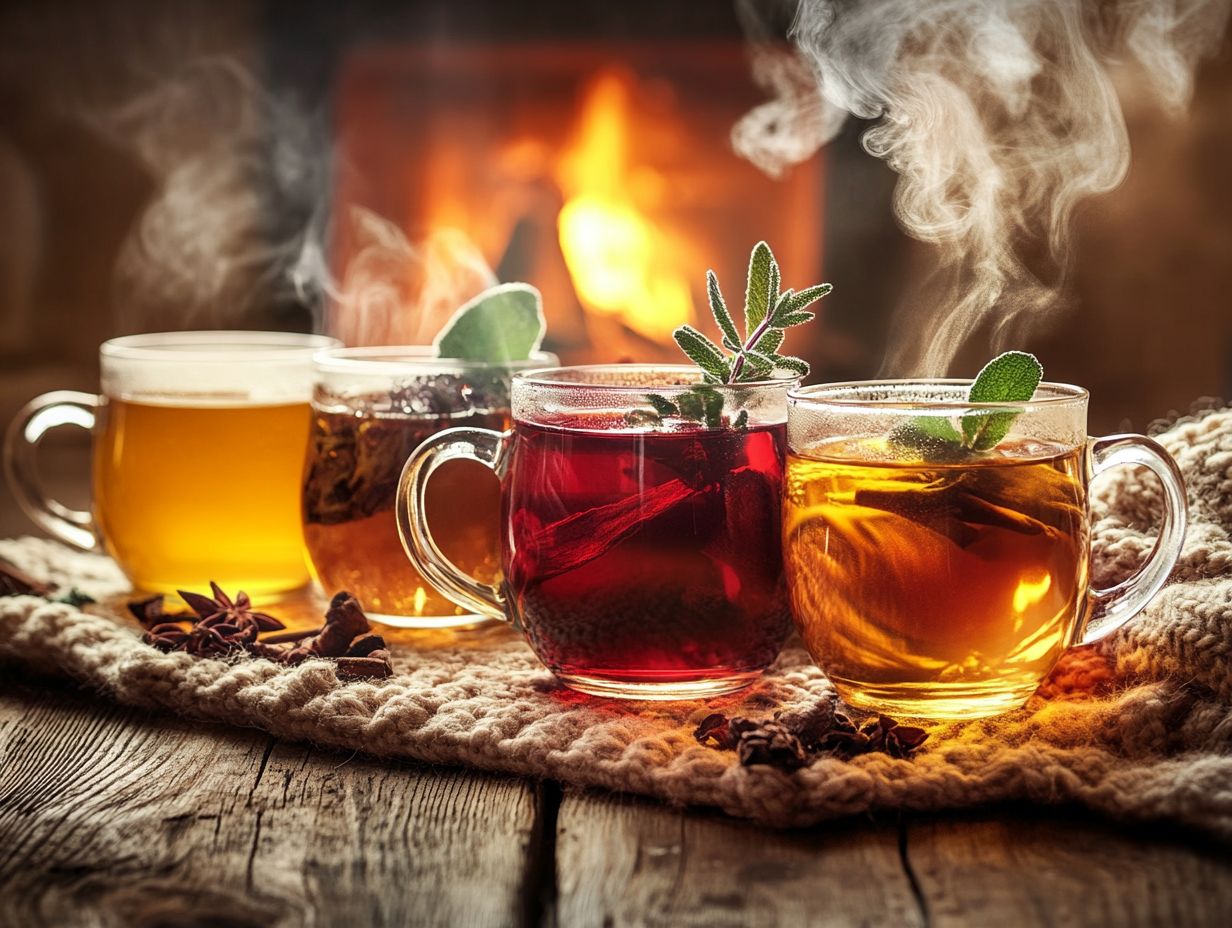
1. What are some comforting herbal tea recipes for cold days?
Comforting herbal tea recipes for cold days include chamomile and lavender tea, ginger and lemon tea, peppermint tea, elderberry tea, and turmeric and honey tea.
2. How do I make chamomile and lavender tea?
To make chamomile and lavender tea, steep 1 tablespoon of dried chamomile flowers and 1 teaspoon of dried lavender in 1 cup of hot water for 5-10 minutes. Strain and enjoy!
3. Can I add milk to ginger and lemon tea?
Yes, you can add milk to ginger and lemon tea to create a creamy and comforting drink. Simply steep 1 tablespoon of grated ginger and 1 teaspoon of lemon juice in 1 cup of hot water, then add a splash of milk before drinking.
4. What are the benefits of elderberry tea?
Elderberry tea is known for its immune-boosting properties and can help alleviate cold and flu symptoms. It is also rich in antioxidants and can help reduce inflammation in the body.
5. Can I use fresh peppermint leaves for peppermint tea?
Yes, you can use fresh peppermint leaves for peppermint tea. Simply steep a handful of fresh leaves in hot water for 5-10 minutes, or until the desired strength is reached.
Why not brew a cup today and feel the difference?
6. How do I make turmeric and honey tea?
Combine 1 teaspoon of ground turmeric and 1 teaspoon of honey in a cup of hot water. Stir until the honey dissolves.
This tea is a wonderful way to boost your immunity and enjoy a soothing experience!

